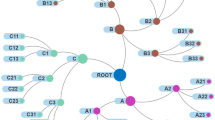Abstract
Scholars of public management have begun to focus on “networking” as a key component of managerial activity ((Agranoff and McGuire, 2001); (Milward and Provan, 2001); (O'Toole and Meier, 1999)). Although the study of networks has garnered considerable academic attention, few studies have worked to bridge previous knowledge about hierarchical organizations with the research on the network. This study introduces the concept of stability into the network, arguing that stability should be a core value in networks, as the function of the network largely depends on repeat interactions. Texas school districts serve as the units of analysis, with the superintendent as the manager of interest. Findings suggest that stability may not always provide the benefits expected in traditional, hierarchical organizations.
Similar content being viewed by others
References
Agranoff, Robert, and Michael McGuire. (2001). “American Federalism and the Search for Models of Management.” Public Administration Review 61(6).
Barnard, Chester. (1938). “The Executive Functions.” In J. Steven Ott (ed.), Classics of Organizational Behavior. Forth Worth: Harcourt Brace College Publishers.
Fiedler, Fred. (1970). “The Contingency Model: A Theory of Leadership Effectiveness.” In J. Steven Ott (ed.), Classics of Organizational Behavior. Forth Worth: Harcourt Brace College Publishers.
Follett, Mary Parker. (1926). “The Giving of Orders.” In J. Steven Ott (ed.), Classics of Organizational Behavior. Forth Worth: Harcourt Brace College Publishers.
Hershey, Paul, and Kenneth H. Blanchard. (1969). “Life Cycle Theory of Leadership.” In J. Steven Ott (ed.), Classics of Organizational Behavior. Forth Worth: Harcourt Brace College Publishers.
Heubert, Jay P., and Robert M. Hauser. (1999). High Stakes: Testing for Tracking, Promotion, and Graduation. Washington, D.C.: National Academy Press.
Jackson, P.M., and L. Stainsby. (2000). “Managing Public Sector Networked Organizations.” Public Money & Management, January–March.
Jencks, Christopher, and Meredith Phillips. (1998). The Black-White Test Score Gap. Washington, D.C.: The Brookings Institute.
Lloyd, J. (1994). “The Changing Cultures of Health and Education.” Health Manpower Management 20(3).
Lynn, Laurence, Carolyn Heinrich, and Carolyn Hill. (2001). Improving Governance: A New Logic for Empirical Research. Washington, D.C.: Georgetown University Press.
McGuire, Michael. (2002). “Managing Networks: Propositions on What Managers Do and Why They Do It.” Public Administration Review 62(5).
McNeil, Linda M. (2000). Contradictions of School Reform: Educational Costs of Standardized Testing. New York: Routledge.
Meier, Kenneth J., and Joseph Stewart. (1991). The Politics of Hispanic Education. Albany: SUNY Press.
Meier, Kenneth J., Robert D. Wrinkle, and J.L. Polinard. (1999). “Representative Bureaucracy and Distributional Equity: Addressing the Hard Question.” Journal of Politics 62 (November).
Milward, H. Brinton, and Keith G. Provan. (2001). “Managing the Hollow State: Collaboration and Contracting.” Presented at the American Political Science Association Annual Conference in San Francisco. August.
Mintzberg, Henry. (1973). The Nature of Managerial Work. New York: Harper and Row.
O'Toole, Laurence J. (1997). “Treating Networks Seriously: Practical and Research-Based Agendas in Public Administration.” Public Administration Review 57(1).
O'Toole, Laurence J., and Kenneth J. Meier. (2003). “Plus ca Change: Public Management, Personnel Stability, and Organizational Performance.” Journal of Public Administration Research and Theory. 13(1).
O'Toole, Laurence J., and Kenneth J. Meier. (2001). “Managerial Strategies and Behaviors in Networks: A Model with Evidence from U.S. Public Education.” Journal of Public Administration Research and Theory 11(3).
O'Toole, Laurence J., and Kenneth J. Meier. (1999). “Modeling the Impact of Public Management: Implications of Structural Context.” Journal of Public Administration Research and Theory 9(4).
Peters, B. Guy. (1995). The Politics of Bureaucracy. London: Routledge.
Peters, B. Guy. (1981). “The Problem of Bureaucratic Government.” Journal of Politics 43(1).
Peterson, G.J. (2002). “Singing the Same Tune: Principals' and School Board Members' Perceptions of the Superintendent's Role as Instructional Leader.” Journal of Educational Administration 40(2).
Provan, K.G., and H.B. Milward. (1995). “A Preliminary Theory of Network Effectiveness: A Comparative Study of Four Mental Health Systems.” Journal of Health Politics, Policy, and Law 19(Winter).
Rainey, Hal. (1997). Understanding and Managing Public Organizations. San Francisco: Jossey-Bass.
Simon, C.A. (1999). “Public School Administration: Employing Thompson's Structural Contingency Theory to Explain Public School Administrative Expenditures in Washington State.” Administration & Society 31(4).
Simon, Herbert A. (1960). The New Science of Management Decision. New York: Harper and Brothers.
Weber, M. (1947). The Theory of Social and Economic Organization. Oxford: Oxford University Press.
Wood, B. Dan. (1990). “Does Politics Make a Difference at the EEOC?” American Journal of Political Science 34(2).
Author information
Authors and Affiliations
Rights and permissions
About this article
Cite this article
Hicklin, A. Network Stability: Opportunity or Obstacles?. Public Organization Review 4, 121–133 (2004). https://doi.org/10.1023/B:PORJ.0000031625.78226.bc
Issue Date:
DOI: https://doi.org/10.1023/B:PORJ.0000031625.78226.bc




